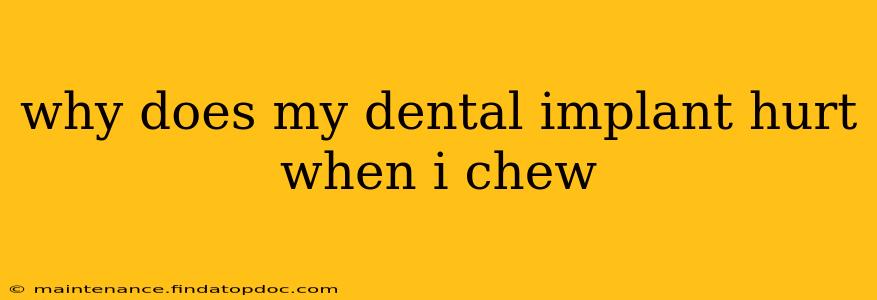Experiencing pain when chewing after dental implant surgery is a common concern. While implants offer a long-term solution for missing teeth, the initial healing period and even later adjustments can cause discomfort. Understanding the reasons behind this pain is crucial for managing expectations and seeking appropriate care. This comprehensive guide will explore the various causes of post-implant chewing pain, offering insights into when to expect it, how to manage it, and when professional help is necessary.
Is it Normal for Dental Implants to Hurt When Chewing?
Some degree of discomfort is expected immediately following dental implant placement. This initial pain is typically managed with prescribed medication. However, pain that persists or worsens after the initial healing phase, specifically when chewing, may indicate a problem. It's crucial to distinguish between normal post-operative discomfort and something more serious.
What Causes Dental Implant Pain When Chewing?
Several factors can contribute to pain when chewing with dental implants. Let's explore some of the most common causes:
1. Osseointegration Process:
- The Issue: The process of osseointegration, where the implant fuses with the jawbone, can cause mild discomfort. As the bone heals and integrates with the implant, some pressure and sensitivity are normal.
- When it Occurs: This discomfort is most common in the initial weeks after surgery and usually subsides as healing progresses.
- Management: Over-the-counter pain relievers, soft foods, and avoiding excessive chewing can usually manage this discomfort.
2. Infection:
- The Issue: Infection around the implant (peri-implantitis) can cause significant pain, especially when chewing. This infection can damage the bone and tissues surrounding the implant.
- When it Occurs: Infection can occur at any time after implant placement, even years later. Symptoms can include swelling, redness, and persistent pain.
- Management: Antibiotics are necessary to treat infection. If left untreated, peri-implantitis can lead to implant failure.
3. Implant Malposition:
- The Issue: If the implant is not placed correctly, it can cause pain when chewing. This can lead to uneven pressure on the implant and surrounding tissues.
- When it Occurs: This is usually apparent during the initial healing period or shortly after the restoration (crown) is placed.
- Management: This often requires corrective measures from your dentist or oral surgeon.
4. Over-Chewing or Hard Foods:
- The Issue: Even after the initial healing period, putting excessive pressure on a recently placed implant can cause pain. Hard or sticky foods can stress the implant and surrounding tissues.
- When it Occurs: This can happen anytime after the healing period, particularly if caution isn't observed.
- Management: A soft-food diet and careful chewing habits can minimize this type of pain.
5. Bite Problems:
- The Issue: Improper bite alignment (malocclusion) can place excessive pressure on the implant, causing pain when chewing. This is particularly relevant if the bite is altered by the new implant.
- When it Occurs: This can present itself immediately after the implant crown is placed or later, as the surrounding tissues adapt.
- Management: Occlusal adjustments may be required to correct bite problems. This may involve occlusal guards or adjustments to the crown or adjacent teeth.
6. Sinus Issues (Upper Jaw Implants):
- The Issue: Implants placed in the upper jaw near the sinus can sometimes cause pain or discomfort if the sinus membrane is irritated or damaged during the procedure.
- When it Occurs: This is usually noticed during the initial healing phase or shortly thereafter.
- Management: Your dentist or oral surgeon will manage this depending on the severity, potentially requiring additional procedures.
When Should I See a Dentist?
Persistent or worsening pain, swelling, redness, or any signs of infection warrant immediate attention. Don't hesitate to contact your dentist or oral surgeon if you experience:
- Severe pain that isn't relieved by over-the-counter pain medication.
- Swelling or redness around the implant site.
- Pus or drainage from the implant site.
- Loose implant or crown.
- Numbness or tingling in the area.
Regular follow-up appointments with your dentist are essential to monitor the healing process and address any potential problems early. Prompt attention can prevent more serious complications and ensure the long-term success of your dental implants.
